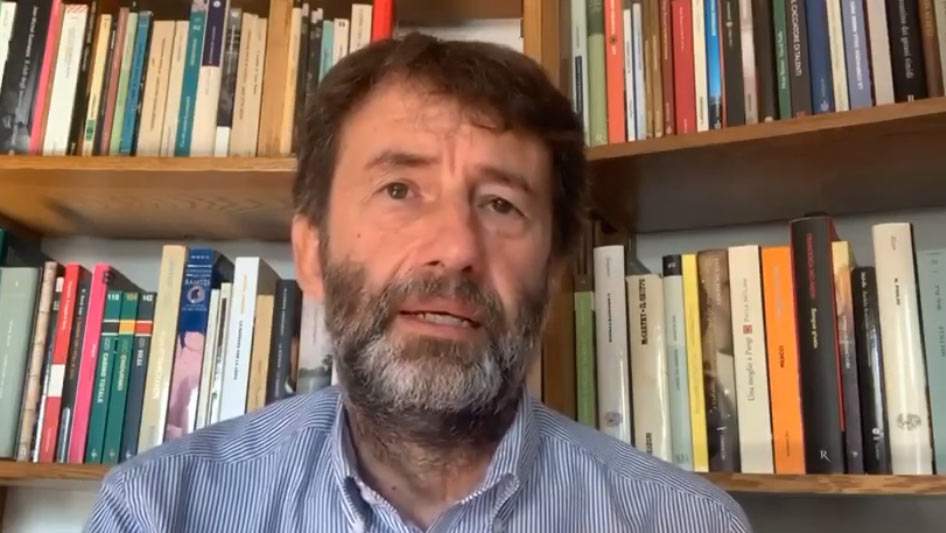Cultural Heritage Minister Dario Franceschini intervened with a video on his Facebook page on yesterday’s dpcm provision that closed cinemas and theaters until Nov. 24. In the video, Franceschini responded to appeals from the world of culture, hinting that there will be no reopenings of cinemas and theaters, and justifying the closure due to an attempt to reduce mobility given the severity of the epidemiological situation. “After yesterday’s dpcm that resulted in the closure of so many activities including cinemas and theaters,” the minister began, “I received many appeals from the world of culture, I read protests, I read articles, I received attacks: all understandable because there is great concern, concern about the very negative symbolic value of closing places of culture, such as cinemas and theaters, particularly in a country like Italy that has culture at the core of its essence and nature. But also the concern about the material damage that businesses and workers in the sector, the better known and the lesser known, may receive.”
“I would like to respond to the remarks I have received as frankly as the criticisms and remarks have been addressed to me,” the minister continued. “I have the impression that the seriousness of the crisis has not been perceived, the risks of contagion at this time have not been perceived, and for that matter one would wonder why when cinemas and theaters were closed equally in March there was not this wave of protest, perhaps it was not understood where we are at.”
“We had a duty to intervene immediately,” Franceschini says, “and the sooner we intervene with the most drastic measures possible, the easier it is to stop the exponential growth of the curve. That’s why the closure of activities where many people hang out was not related to a hierarchical choice (it would be absurd to choose that way) of importance, whether theaters or gyms are more important, the whole rather cloying debate I witnessed. It stemmed from the need to reduce the mobility of people: the philosophy, the motivation behind closing all activities after 6 p.m. is exactly that, and the sooner you take action the sooner you can change the trend of the curve.”
“I am committed to this closure being as short as possible,” the minister then promises. “It will of course depend on the epidemiological trend, but this is my commitment. Those who govern have to take responsibility, it has to be like that always, let alone inside a health, social, economic emergency like this one. You can do things right or wrong but there has to be a collective and individual assumption of responsibility: that’s why we discussed in government, as was logical, what measures to take, and everyone brought the rights and demands of the worlds they represent by leading a ministry. But I take direct responsibility for this choice, then time will tell whether it was right or wrong, necessary or not. What is needed now is to get everyone on the same side. I add my commitment to protect entertainment workers, especially the lesser known, the less visible, film workers, to help businesses. As we have been doing in recent months: we have allocated 1.2 billion for the performing arts and cinema, directly of resources from the ministry, plus that whole set of interventions for general companies, interventions for layoffs, in sectors that did not have it completely. It is not enough, it is not enough, we will have to do more, we will have to do more: first of all immediately compensate those who suffered the consequences of the immediate closure of this dpcm.”
“I wrote a letter to the televisions this morning,” Franceschini revealed, “asking the televisions (to the public one, which has the duty, because it is a public service, but also to the others), to give more space to culture, to buy shows, to broadcast them, to pay the rights to help culture not in a symbolic way but in a material way. We have been working for a few months on this platform of Italian culture that will be able to offer in streaming to those who cannot go to the theater the possibility of seeing a show, and in such a way as to have revenue and offer Italian culture without thinking in any way to replace the direct relationship with the public (it is called live show for this reason, so no one thinks of replacing theaters, but of integrating).”
“If in an emergency like this the country is divided, the problems and risks become much greater,” the minister concluded, appealing to social cohesion. “I think the answer is for each of us to do our duty, as best we can. I, too, am trying to do simply that. If everyone does his or her duty we will rebuild that climate of social cohesion that is so badly needed, then the time will come for divisions and analysis of what was done right and what was done wrong, but today in the face of contagions, in the face of sick people, in the face of risks to life, to health, this is not the time. That’s why I ask you who have a great influence, you personalities of culture, you world of culture in general, who have a great influence on public opinion and a great capacity because you are testimonials of values of such a great force as culture is in Italy, to make a contribution for social cohesion, we have a great need for it.”
 |
| Franceschini responds to appeals: perhaps the gravity of the situation is not understood |
Warning: the translation into English of the original Italian article was created using automatic tools. We undertake to review all articles, but we do not guarantee the total absence of inaccuracies in the translation due to the program. You can find the original by clicking on the ITA button. If you find any mistake,please contact us.